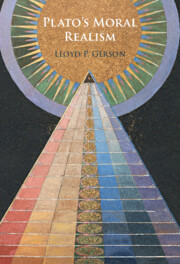187 results
Chapter 1 - Introduction
-
- Book:
- Plato's Moral Realism
- Published online:
- 28 July 2023
- Print publication:
- 24 August 2023, pp 1-28
-
- Chapter
- Export citation
Copyright page
-
- Book:
- Plato's Moral Realism
- Published online:
- 28 July 2023
- Print publication:
- 24 August 2023, pp iv-iv
-
- Chapter
- Export citation
Chapter 7 - Morality, Religion, and Politics
-
- Book:
- Plato's Moral Realism
- Published online:
- 28 July 2023
- Print publication:
- 24 August 2023, pp 190-222
-
- Chapter
- Export citation
Acknowledgments
-
- Book:
- Plato's Moral Realism
- Published online:
- 28 July 2023
- Print publication:
- 24 August 2023, pp viii-viii
-
- Chapter
- Export citation
Bibliography
-
- Book:
- Plato's Moral Realism
- Published online:
- 28 July 2023
- Print publication:
- 24 August 2023, pp 228-249
-
- Chapter
- Export citation
Chapter 4 - Socratic versus Platonic Ethics?
-
- Book:
- Plato's Moral Realism
- Published online:
- 28 July 2023
- Print publication:
- 24 August 2023, pp 116-146
-
- Chapter
- Export citation
Chapter 2 - The Idea of the Good
-
- Book:
- Plato's Moral Realism
- Published online:
- 28 July 2023
- Print publication:
- 24 August 2023, pp 29-74
-
- Chapter
- Export citation
General Index
-
- Book:
- Plato's Moral Realism
- Published online:
- 28 July 2023
- Print publication:
- 24 August 2023, pp 260-264
-
- Chapter
- Export citation
Dedication
-
- Book:
- Plato's Moral Realism
- Published online:
- 28 July 2023
- Print publication:
- 24 August 2023, pp v-vi
-
- Chapter
- Export citation
Contents
-
- Book:
- Plato's Moral Realism
- Published online:
- 28 July 2023
- Print publication:
- 24 August 2023, pp vii-vii
-
- Chapter
- Export citation
Chapter 6 - Philebus and Statesman
-
- Book:
- Plato's Moral Realism
- Published online:
- 28 July 2023
- Print publication:
- 24 August 2023, pp 171-189
-
- Chapter
- Export citation
Chapter 5 - Moral Responsibility
-
- Book:
- Plato's Moral Realism
- Published online:
- 28 July 2023
- Print publication:
- 24 August 2023, pp 147-170
-
- Chapter
- Export citation
Chapter 3 - Virtue, Knowledge, and the Good
-
- Book:
- Plato's Moral Realism
- Published online:
- 28 July 2023
- Print publication:
- 24 August 2023, pp 75-115
-
- Chapter
- Export citation
Chapter 8 - Concluding Remarks
-
- Book:
- Plato's Moral Realism
- Published online:
- 28 July 2023
- Print publication:
- 24 August 2023, pp 223-227
-
- Chapter
- Export citation
Index Locorum
-
- Book:
- Plato's Moral Realism
- Published online:
- 28 July 2023
- Print publication:
- 24 August 2023, pp 250-259
-
- Chapter
- Export citation

Plato's Moral Realism
-
- Published online:
- 28 July 2023
- Print publication:
- 24 August 2023
Introduction
-
-
- Book:
- The New Cambridge Companion to Plotinus
- Published online:
- 25 May 2022
- Print publication:
- 02 June 2022, pp 1-12
-
- Chapter
- Export citation
Chapter 14 - At the Intersection of Cosmology and Biology
-
-
- Book:
- Cosmology and Biology in Ancient Philosophy
- Published online:
- 21 May 2021
- Print publication:
- 10 June 2021, pp 245-260
-
- Chapter
- Export citation
Chapter 8 - Plotinus on Immortality and the Problem of Personal Identity
-
-
- Book:
- Immortality in Ancient Philosophy
- Published online:
- 20 May 2021
- Print publication:
- 03 June 2021, pp 178-195
-
- Chapter
- Export citation
1.1 - The Perennial Value of Platonism
- from I - Concepts
-
-
- Book:
- Christian Platonism
- Published online:
- 20 January 2021
- Print publication:
- 17 December 2020, pp 13-33
-
- Chapter
- Export citation



